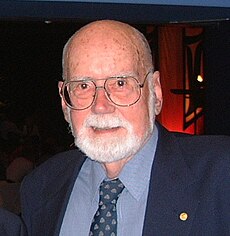E. Donnall Thomas
This article needs additional citations for verification. (June 2020) |
E. Donnall Thomas | |
|---|---|
 Thomas in 2000 | |
| Born | Edward Donnall Thomas March 15, 1920 Mart, Texas, U.S. |
| Died | October 20, 2012 (aged 92) Seattle, Washington, U.S. |
| Citizenship | American |
| Alma mater | University of Texas at Austin (BA, MA) Harvard University (MD) |
| Known for | Transplantation |
| Awards | Nobel Prize in Physiology or Medicine National Medal of Science |
| Scientific career | |
| Fields | Medicine |
| Institutions | Mary Imogene Bassett Hospital |
| Notable students | Eloise Giblett |
Edward Donnall "Don" Thomas (March 15, 1920 – October 20, 2012)[1] was an American physician, professor emeritus at the University of Washington, and director emeritus of the clinical research division at the Fred Hutchinson Cancer Research Center. In 1990 he shared the Nobel Prize in Physiology or Medicine with Joseph E. Murray for the development of cell and organ transplantation. Thomas and his wife and research partner Dottie Thomas developed bone marrow transplantation as a treatment for leukemia. Thomas was a lead investigator in two failed clinical trials at Seattle's Fred Hutchinson Cancer Research Center — experiments in which the Center and its doctors had a financial interest. The patients and their families were never told about those connections, nor were they fully and properly informed about the risks of the experiments.}}</ref>Cite error: A <ref> tag is missing the closing </ref> (see the help page).[2] "In 1955, he was appointed physician in chief at the Mary Imogene Bassett Hospital, now Bassett Medical Center, in Cooperstown, New York, an affiliate of Columbia University."[3]
At Mary Imogene Bassett, he began to study rodents that received lethal doses of radiation who were then saved by an infusion of marrow cells. At the time, patients who underwent bone marrow transplantation all died from infections or immune reactions that weren't seen in the rodent studies. Thomas began to use dogs as a model system. In 1963, he moved his lab to the United States Public Health Service in Seattle.[4]
Thomas also received National Medal of Science in 1990. In 2003 he was one of 22 Nobel laureates who signed the Humanist Manifesto.[5]
He died of heart failure.[4]
Awards and honors[edit]
- 1965-1969 Hematology Study Section, National Institutes of Health
- 1969-1973 Member, Board of Trustees and Medical and Scientific Advisory Committee, Leukemia Society of America, Inc.
- 1970-1974 Clinical Cancer Investigation Review Committee, National Cancer Institute
- 1974 First Annual Eugene C. Eppinger Lecture at Peter Bent Brigham Hospital and the Harvard Medical School
- 1975 A. Ross McIntyre Award, University of Nebraska Medical Center
- 1975 The Henry M. Stratton Lecture, American Society of Hematology, Dallas
- 1977 The Lilly Lecture, Royal College of Physicians, London
- 1979 The Philip Levine Award, American Society of Clinical Pathologists, New Orleans
- 1980 American Cancer Society Award for Distinguished Service in Basic Research
- 1981 Kettering Prize of the General Motors Cancer Research Foundation for contributions to the diagnosis and treatment of cancer
- 1981 Honorary Doctorate of Medicine, University of Cagliari, Sardinia
- 1981 Special Keynote Address Award, American Society of Therapeutic Radiologists
- 1982 Stratton Lecture, International Society of Hematology
- 1982 Paul Aggeler Lecturer, University of California, San Francisco
- 1983 David A. Karnofsky Memorial Lecturer, Annual Meeting of the American Society of Clinical Oncology
- 1983 Robert Roesler de Villiers Award, Leukemia Society of American
- 1984 Sixty-fifth Mellon Lecturer, University of Pittsburgh School of Medicine, May 13
- 1985 Stanley Wright Memorial Lecturer, Annual Meeting of the Western Society for Pediatric Research
- 1987 Karl Landsteiner Memorial Award, Annual Meeting of the American Association of Blood Banks,
- 1987-1988 President, American Society of Hematology
- 1989 Elected Corresponding Member, Academie Royale de Medecine de Belgigue
- 1990 Terry Fox Award, Canada
- 1990 Gairdner Foundation International Award
- 1990 North American Medical Association of Hong Kong Prize
- 1990 Nobel Prize in Medicine
- 1990 Presidential Medal of Science
- 1991 Adolfo Ferrata Lecture, Italian Society of Hematology, Verona, Italy
- 1991 Honorary Doctorate of Medicine, University of Verona
- 1992 Kober Medal, American Association of Physicians
- 1992 Honorary Member, The Royal College of Physicians and Surgeons of Canada
- 1992 Honorary Doctorate of Medicine, University of Parma
- 1993 Golden Plate Award of the American Academy of Achievement[6]
- 1994 Honorary Member, National Academia of Medicine
- 1994 Honorary Degree, University of Barcelona
- 1996 Honorary Degree, University of Warsaw
- 1998 Medal of Merit, State of Washington
References[edit]
- ^ Frederick R. Appelbaum. Perspective: E. Donnall Thomas (1920–2012) Science 338(6111):1163, 30 November 2012
- ^ Piana, Ronald. "Nobel Laureate E. Donnall Thomas, MD, Dies at 92", The ASCO Post website, November 15, 2012. Retrieved May 22, 2022.
- ^ "E. Donnall Thomas, Who Advanced Bone Marrow Transplants, Dies at 92". The New York Times. October 24, 2012.
- ^ a b Storb, R. (2012). "Edward Donnall Thomas (1920–2012)". Nature. 491 (7424): 334. Bibcode:2012Natur.491..334S. doi:10.1038/491334a. PMID 23151572.
- ^ "Notable Signers". Humanism and Its Aspirations. American Humanist Association. Archived from the original on October 21, 2015. Retrieved October 4, 2012.
- ^ "Golden Plate Awardees of the American Academy of Achievement". www.achievement.org. American Academy of Achievement.
External links[edit]
- Fred Hutchinson Cancer Research Center. Nobel Prize: The Don and Dottie Story
- E. Donnall Thomas on Nobelprize.org including the Nobel Lecture 8 December 1990 Bone Marrow Transplantation - Past, Present and Future
- 1920 births
- 2012 deaths
- Members of the United States National Academy of Sciences
- University of Washington faculty
- Nobel laureates in Physiology or Medicine
- American Nobel laureates
- American hematologists
- National Medal of Science laureates
- Harvard Medical School alumni
- Columbia University people
- Physicians of Brigham and Women's Hospital
- United States Army Medical Corps officers
- Presidents of the American Society of Hematology
